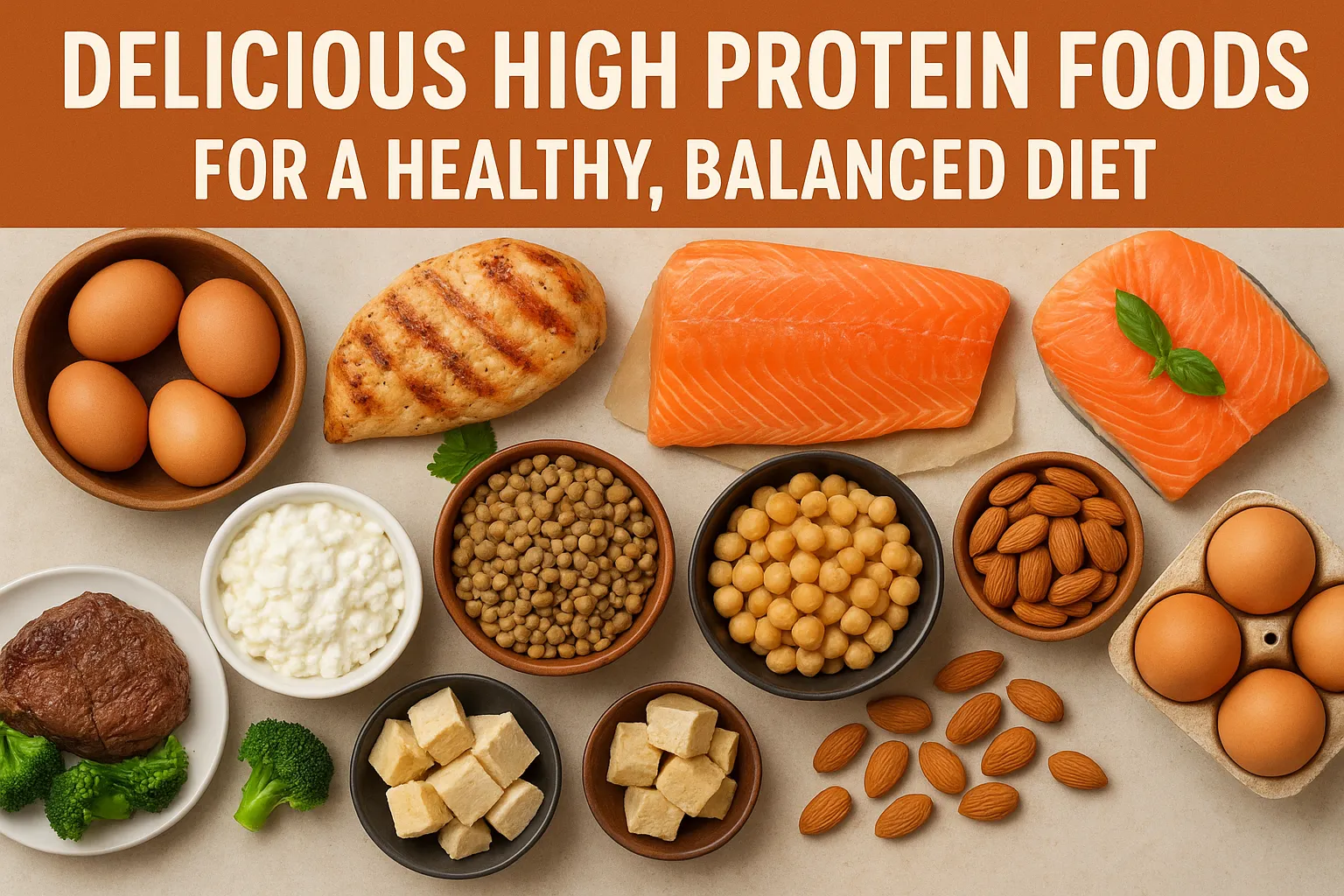Table of Contents
🥗 Introduction to High Protein Foods

Protein is a vital macronutrient essential for muscle repair, bone strength, hormone regulation, and satiety. Incorporating **high protein foods** into your diet is crucial for weight management, muscle growth, or overall wellness. For instance, choosing these foods supports a healthier lifestyle.
Healthy eating doesn’t mean dull meals. Instead, numerous **high protein foods** offer both nutrition and flavor, ensuring variety and satisfaction. This article explores 25 protein-rich options—from animal to plant-based choices—to help you maintain a balanced diet. For more on balanced nutrition, see our guide on the Top 10 Health Benefits of a Balanced Diet.
High Protein Foods
🥩 Animal-Based Protein-Rich Foods
Eggs: A Versatile High Protein Food
Protein per egg: ~6 g
Eggs are a cornerstone of **high protein foods**, packed with high-quality protein, essential amino acids, and vitamins like B12 and D. Boil, scramble, poach, or bake them for versatile meal options.
High Protein Foods
Chicken Breast: Lean Protein-Packed Food
Protein per 100 g: ~31 g
Skinless chicken breast is lean, low in fat, and ideal for weight loss and muscle gain. Grill, roast, or stir-fry it with vegetables for a balanced meal.
Turkey: Nutrient-Dense High Protein Food
Protein per 100 g: ~29 g
Turkey, a lean poultry option, is rich in selenium and zinc, supporting immune health. Enjoy it roasted or sliced for sandwiches.
High Protein Foods
Salmon: Omega-3 Rich Protein Food
Protein per 100 g: ~25 g
Salmon, a standout among **high protein foods**, delivers omega-3 fatty acids for heart and brain health. Bake with herbs or pan-sear for a nutritious meal.
Tuna
Protein per 100 g: ~29 g
Tuna is a budget-friendly protein source, low in fat, and perfect for salads, sandwiches, or pasta.
Greek Yogurt
Protein per 100 g: ~10 g
Creamy Greek yogurt offers double the protein of regular yogurt and probiotics for digestion. Pair it with fruits or use in smoothies.
Cottage Cheese
Protein per 100 g: ~11 g
Low-fat cottage cheese, rich in casein protein, digests slowly, making it ideal for nighttime snacks to prevent muscle breakdown.
Lean Beef
Protein per 100 g: ~26 g
Lean beef provides iron, zinc, and vitamin B12. Choose cuts like sirloin or tenderloin for health benefits.
Shrimp
Protein per 100 g: ~24 g
Shrimp is low-calorie, high in protein, and rich in antioxidants like astaxanthin. Use in stir-fries, curries, or salads.
High Protein Foods
Egg Whites
Protein per 100 g: ~11 g
Egg whites offer pure protein with minimal fat, great for omelets, shakes, or baking.
🌱 Plant-Based Protein-Packed Foods
Lentils: Fiber-Rich High Protein Food
Protein per 100 g (cooked): ~9 g
Lentils, a staple in **high protein foods**, are rich in fiber, folate, and iron. Ideal for soups, dals, stews, or salads.
Chickpeas
Protein per 100 g (cooked): ~8 g
Chickpeas are versatile for hummus, curries, or roasted snacks, and fiber-rich for digestive health.
Black Beans
Protein per 100 g (cooked): ~9 g
Black beans provide protein, fiber, and antioxidants, perfect for burritos, soups, or veggie burgers.
Kidney Beans
Protein per 100 g (cooked): ~8 g
Kidney beans, great for chili, salads, or stews, are filling and packed with magnesium.
Edamame
Protein per 100 g: ~11 g
Young soybeans, boiled or steamed, are a protein-rich snack with vitamin K and folate.
Tofu
Protein per 100 g: ~8 g
Tofu, a soy-based protein, absorbs flavors well and works in stir-fries, curries, or grilled dishes.
Tempeh
管Protein per 100 g: ~19 g
Fermented soybeans with a nutty flavor, tempeh supports gut health with probiotics and offers high protein.
Quinoa
Protein per 1 cup cooked: ~8 g
Quinoa, a complete protein with all nine essential amino acids, is gluten-free and a great rice substitute.
Pumpkin Seeds: Nutrient-Dense Protein Food
Protein per 100 g: ~19 g
Pumpkin seeds are protein-rich and packed with magnesium and zinc. Sprinkle on oatmeal or salads.
Almonds
Protein per 100 g: ~21 g
Al for snacks or nut butter.
Peanut Butter
Protein per 2 tbsp: ~8 g
Creamy peanut butter pairs well with whole-grain bread or smoothies for a protein boost.
Chia Seeds
Protein per 100 g: ~17 g
Chia seeds form a gel when soaked, perfect for puddings, overnight oats, or smoothies.
high protein diet
Sunflower Seeds
Protein per 100 g: ~21 g
Sunflower seeds offer protein and vitamin E, great for trail mix or salads.
Oats
Protein per 100 g: ~13 g
Oats provide carbs and protein, ideal for breakfast bowls or protein bars.
Seitan: High Protein Meat Alternative
Protein per 100 g: ~25 g
Seitan, made from wheat gluten, is a high-protein meat alternative for various dishes.
✅ Benefits of High Protein Foods
- Builds and repairs muscles for strength and recovery.
- Promotes weight management by enhancing satiety.
- Supports hormone and enzyme production for bodily functions.
- Strengthens bones and boosts metabolism.
- Provides sustained energy to prevent fatigue.
Learn how **high protein foods** complement a balanced diet in our article on Top 10 Health Benefits of a Balanced Diet.
❓ FAQs on High Protein Diets
- How much protein do I need daily? Most adults need 0.8–1.2 grams per kilogram of body weight, with athletes requiring up to 2 g.
- Can vegetarians get enough protein? Yes, **high protein foods** like lentils, beans, tofu, tempeh, and quinoa offer ample protein.
- Are high protein foods good for weight loss? Absolutely, **protein-rich foods** reduce cravings and preserve muscle during fat loss.
- Which is healthier—plant or animal protein? Both are beneficial; a mix ensures all essential amino acids.
- What are the best high protein snacks? Greek yogurt, nuts, seeds, protein bars, and boiled eggs are top choices.
For more on boosting energy with diet, check out 10 Daily Habits to Boost Energy & Fitness.
🏁 Conclusion
Incorporating these 25 delicious **high protein foods** into your meals supports a healthy, balanced diet without compromising taste. Whether your goal is muscle building, weight loss, or wellness, these **protein-rich foods** offer variety and nutrition. For insights on how biotech innovations can further enhance health, explore Biotechnology Breakthroughs: Transforming Healthcare in 2025-26.
For additional nutrition tips, visit Healthline’s High Protein Foods Guide.
⚠️ Disclaimer
This article is for educational purposes only and is not medical or dietary advice. Nutritional needs vary by age, gender, activity level, and health conditions. Consult a qualified healthcare provider or nutritionist before making significant dietary changes.


